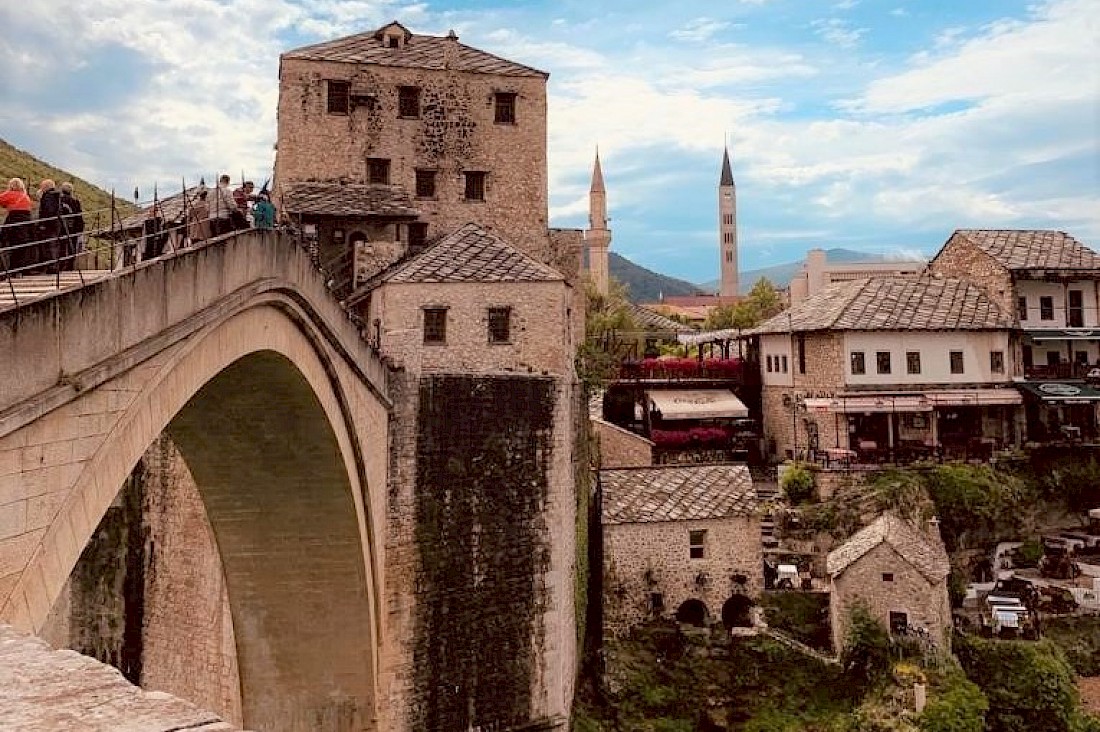25 Jahre nach Dayton: Bosnien und Herzegowina zwischen Ethnonationalismus und Bürgergesellschaft
Sprache: Englisch/Deutsch (Simultanübersetzung)
*For English version please see below*
Begrüßung:
Manuel Sarrazin, MdB, Sprecher für Osteuropapolitik der Bundestagsfraktion Bündnis 90 / Die Grünen, Präsident der Südosteuropa-Gesellschaft, Berlin / Hamburg
Auf dem Podium diskutieren:
Dr. Valentin Inzko, Hoher Repräsentant für Bosnien und Herzegowina, Sarajevo
Susanne Schütz, Beauftragte für Südosteuropa, die Türkei, OSZE und Europarat im Auswärtigen Amt, Berlin
Mirsad Hadžikadić, Vorsitzender und Gründer, Platform for Progress, Sarajevo
Majda Ruge, Senior Policy Fellow, Western Balkans, European Council on Foreign Relations, Berlin
Prof. Dr. Joseph Marko, ehemaliger internationaler Richter am Verfassungsgerichtshof von Bosnien und Herzegowina, Universität Graz
Moderation:
Adelheid Wölfl, Südosteuropa-Korrespondentin, Der Standard, Sarajevo
Zum Inhalt
Ende 1995 konnte mit dem Friedensabkommen von Dayton der Krieg in Bosnien und Herzegowina endlich beendet werden. Bis heute ist das Land jedoch ein in weiten Teilen dysfunktionaler Staat und nicht alle Bürgerinnen und Bürger verfügen über die gleichen Rechte. Die ethnische Spaltung der Gesellschaft schreitet voran, die Glorifizierung von Kriegsverbrechen gehört keineswegs der Vergangenheit an.
25 Jahre nach Dayton wollen wir deshalb die aktuellen Herausforderungen des Landes zwischen Ethnonationalismus und Bürgergesellschaft diskutieren: Welche Veränderungen braucht es, damit Bosnien und Herzegowina sich zu einer Bürgergesellschaft mit gleichen Rechten für alle Bürgerinnen und Bürger entwickeln kann? Wie könnte die EU das Land bei der Umsetzung der von der Europäischen Kommission formulierten 14 EU-Reformprioritäten besser unterstützen? Welche Rolle sollte dabei die Zivilgesellschaft spielen? Welche Rolle spielt die derzeit - auch von der kroatischen Regierung - unterstützte Reform des Wahlgesetzes für eine Einigung oder weitere ethnische Spaltung des Landes? Welche Position und Rolle wird die neue US-Regierung einnehmen und wie sollten die Politik der EU und die des Büros des Hohen Repräsentanten besser verzahnt werden? Und: Welche Relevanz haben jüngste Überlegungen einzelner Akteure, in Bosnien und Herzegowina (und in der gesamten Region) neue Grenzen nach ethnischen Kriterien zu ziehen?
Darüber wollen wir mit den Expertinnen und Experten und den Zuschauerinnen und Zuschauern ins Gespräch kommen.
*********************************************************************************
25 Years After Dayton: Bosnia and Herzegovina Between Ethnonationalism and “Citizens’ Society”
Welcome / Introduction:
Manuel Sarrazin, Member of the German Bundestag, Spokesperson for Eastern Europe of the Parliamentary Group Alliance 90/The Greens, President of the Southeast Europe Association, Berlin
Panelists:
Dr. Valentin Inzko, High Representative for Bosnia and Herzegovina, Sarajevo
Ambassador Susanne Schütz, Director for South-Eastern Europe, Turkey, EFTA States, OSCE and the Council of Europe in the German Federal Foreign Office
Mirsad Hadžikadić, President and Founder of the Platform for Progress, Sarajevo
Dr. Majda Ruge, Senior Policy Fellow, Western Balkans, European Council on Foreign Relations, Berlin
Prof. Dr. Joseph Marko, former International Judge at the Constitutional Court of Bosnia-Herzegovina/ Professor at the University of Graz
Moderation:
Adelheid Wölfl, Southeast Europe correspondent, Der Standard, Sarajevo
Topic
At the end of 1995, the Dayton Peace Agreement finally ended the war in Bosnia and Herzegovina. To this day, however, the country is in most of its spheres a dysfunctional state, and not all citizens have the same rights. The ethnic division in the society is growing and the glorification of war crimes is by no means a thing of the past.
Therefore, 25 years after Dayton, we want to discuss the current challenges facing the country: What changes are needed so that Bosnia and Herzegovina can develop into a “citizens’ society” with equal rights for all citizens? How could the EU better support the country in implementing the 14 reform priorities formulated by the European Commission? What role should civil society play in this? What role does the reform of the electoral law - which is currently also supported by the Croatian government - play in the unification or further ethnic division of the country? What position and role will the new US administration take and how should the policies of the EU and those of the Office of the High Representative be better dovetailed? And: What relevance do the latest considerations of individual actors to draw new borders according to ethnic criteria in Bosnia and Herzegovina (and in the entire region) have?
We kindly invite you to discuss these and other questions with our experts!
Am 04.05.2021, 18:30 h
Venue: Zoom

